Photographs: Courtesy Globsyn Skills Divya Nair
How can you make a country's educated youth employable? Rahul Dasgupta of Globysn Skills has some answers.
Globsyn Skills, a Kolkata-based vocational training organisation is far from complaining about the unemployability of our graduates.
Besides having mentored and trained thousands of technical graduates to identify their aptitude, they now aim to make 150 million youth across India employable by 2022.
In an interview with Rediff.com's Divya Nair, Rahul Dasgupta, director of Globysn Skills, talks about why educational institutes and corporate organisations must stop complaining and focus on investing in skills-based learning.
Reader Invite: Dear readers, what do you think young graduates should do to make themselves employable? Share your advice in the message board below.
Please click NEXT to continue reading...
'Vocational training will be the future of education'
Image: Without vocational training or internship experience, graduates find themselves at a disadvantage.Photographs: Courtesy Globsyn Skills
First off, what role do you see the corporate sector and educational institutions playing in making young Indians employable?
Corporate organisations and educational institutes must understand that vocational training will be the future of education. Unfortunately, even though there is a large need for skill-based learning, we do not have a lot many training institutes to cater to this demand.
The institutes that do work in the area however leave a lot to be desired. We need to first standardise the standards of training at these centres by aligning their curriculum to meet the gaps in our education system.
Large educational institutions must encourage training centres to set up skill labs within their campuses so their students are better prepared to face the world outside.
At the same time, corporate firms must recognise these courses and respect students who have additional skills. Most often, students complain that organisations value internship experience but ignore skill training and certificate programmes.
Corporate professionals and hiring executives must appreciate the fact that the student has taken one step ahead of academics and attach importance to skill enhancement initiatives. Once standardisation comes into place, we believe that the current situation will improve for the better.
CV tips: Focus on skills, show your passion
Image: Students register for a summer induction programme.Photographs: Courtesy Globsyn Skills
What do you suggest young graduates do to ensure that they get a job at the end of their education?
The job search process can be divided into various stages depending on the candidate's skills and proficiency. The first step is to find out what your aptitude is.
In the absence of a counsellor or consultant, the candidate must ask: What is my core area of interest?
Next, they must find out what are the skills required to pursue a career in the intended field of interest. For example, if you are looking for a career in marketing, you must be competent in selling products/services and have good communication skills. Job skills are often mentioned under the said job position.
While applying for a job, make a mental note of the required job skills, it will help you understand what the employer expects from you. While in college, students can try and work on these skills and improve them.
Reading and writing skills can help a great deal here. If the student is passionate about something, they must at least read about the emerging trends in their area of interest.
Trivial as it may sound students must cultivate the habit of writing 100-200 words on a subject that interests them. This will help them express their thoughts and give them an edge in the job interview.
Students must invest time in writing the CV and update it from time to time to include the most recent achievements and projects. The resume is the first introduction to the employer. So put your best foot forward!
'A job interview is like the litmus test'
Image: How you perform in the interview decides whether you get the job or not.Photographs: Chris Hondros/Getty Images
You have been a resume editor. Please tell us what are the common mistakes that fresh graduates make in their CV?
The list is endless. But the following suggestions can be useful:
A badly formatted CV upsets every employer. Inconsistent bulleted points, subheads point out that the applicant is not serious about her/his career.
Spelling mistakes are unforgivable. I fail to understand how some of them misspell the names of their schools and colleges. Worse is when you have technical aspirants spell programmes like Java, Oracle incorrectly.
Students must ensure consistency of information. Structure your CV according to whether you want to focus on your projects or academic achievements.
Your CV must have the most important information or recent achievement on the top.
Frankly, but unfortunately, nobody has the time to read through the entire CV. If it doesn't hold their interest in the first 20 seconds, chances are you will never get that interview call.
How can youngsters perform better in a job interview?
A job interview is like the litmus test. It aims to better understand you as a person and looks beyond what you have already mentioned in your CV.
At the interview stage, the employer would like to know how passionate you are about taking up the job, what you can do to add value to the organisation etc.
I have been part of the interview panel and let me share a few experiences with you.
The interviewer is always interested to know more about your aptitude and will try to find out what you have done about it. So, if you say you are interested in gadgets and technology, ensure that you know the names of at least two or three leading gadget magazines or websites, besides having updated information on the emerging trends in technology.
Be prepared to answer perspective questions like: What is your opinion on...? What do you think about Mr X's decision on...?
These questions merely aim to test your communication and presentation skills besides helping the employer understand how passionate you are about the field you have applied to.
'Most Indian graduates ignore the first two crucial years of education'
Image: Graduates have to take additional training in vocational skills to be employablePhotographs: Careers360
Your institute trains engineering graduates only. Why is that?
It wasn't a conscious choice at all. In 1997, when we began, the IT industry had just emerged and there was a serious dearth of qualified technical professionals. We introduced a unique six months long Young Software Manager (YSM) programme for engineering graduates.
Besides being an intensive programme, that was the first time anyone had ever used the terms 'software' and 'manager' together.
We had realised early on that technical professionals will demand managerial and communication skills to move ahead in their careers. With YSM, we were pioneering the concept of technical managers in the country -- something that was unheard of in those days.
Why do you think engineers need vocational training to be considered for employment?
It is unfortunate, but over the years, the quality of technical education in our country has suffered greatly due to dated curriculum, inefficient faculty who have poor industrial knowledge and also due to the influx of new engineering colleges in the system. The intake quality of students has been compromised in these new colleges, due to competition and the greed for turning education into a business opportunity.
Besides, in our country most students, especially engineering graduates, ignore the first two years of education when they miss out on the basics ie analytics, logic and reasoning. The rest of the two years are spent in completing assignments and completing the course.
However, during these four years of education, neither the institute nor the students do anything about testing the latter's aptitude for the course. What's worse is they also don't get the opportunity to enhance their skills and knowledge.
Without the benefit of internship or intervention programmes, these students cannot be directly employed by organisations. Even employers realise that the students do not have mastery over core competency skills like coding, programming, technology testing, communication etc and hence cannot be hired. It's a vicious cycle.
'We have a psychological belief that communication skills are not all that important'
Image: Image for representational purposes onlyPhotographs: Rediff Archives
What were your learnings while working with technical graduates?
While working with students, we realised that technical training was only the first step towards making them employable. To give you an example, last year, we decided to host a graduation ceremony to felicitate our students who had completed the course.
We hired the biggest auditorium in Kolkata -- the Science City auditorium. One by one as we announced the names of students; we could see them walking to the stage.
Some of them trembled, some faltered, others were nervous because these students had never been in a situation of this magnitude before. They had never faced such a large audience. For us, this was a part of the training process.
We realised that besides the lack of technical and core job skills, students were not groomed in basic presentation and communication skills.
In India, we are so focused on academic training, that we ignore attributes like self confidence and self efficacy. We have a psychological belief that communication skills are not all that important.
That's exactly why students underperform during the recruitment stage also. Not all engineers are deficient in skills and talent.
Most of them have never visited a large organisation and are already anxious about the alien environment. When they face the panel, they feel more scared and end up performing badly.
Most often, students do know the answers, but don't know how to present them. What they actually lack is poor presentation and communication skills.
'We had trouble explaining students that we were not a recruiting agency'
Image: Youngsters attend a rural training programme in Bhubaneshwar, OrissaPhotographs: Courtesy Globsyn Skills
Finally, how do you propose to make 150 million youth across India employable by 2022?
Under the Skills for India initiative in partnership with the National Skills Development Corporation, we have launched various programmes. Last year, we were able to train over 10,000 people in West Bengal and Orissa alone.
We plan to train 21,000 people next year out of which we have received a mandate to train 15,000 from Rajasthan and 6,300 from Orissa which makes the total for next year (2013) to be 21,300 already. In addition, we intend to train another 8,000 people through our various retail programmes. So although our target was to increase our training capacity by over 100 per cent, we might cross our own expectations and reach a figure close to 30,000 by end of 2013 for the year.
As for ongoing training programmes in Orissa, we are currently in the process of training 300+ candidates for Orisssa State Employment Mission (OSEMS) and State Urban Development Agency (SUDA) in Mohona, Behrampur, Berger, Gopalpur, Sundargarh, Angul, Dhenkanal amongst other locations.
We aim to reach out to states like Jharkhand, Bihar, Rajasthan and Assam in the next few years. Our aim is to train 150 million people across 21 sectors by 2022.
And what is the average cost of these programmes?
The average cost of the SFI programmes range from Rs 2,500 for a three to four weeks course to Rs 8,000 for a two-month course. Courses include training for IT/IT enabled services, security, retail operations, mobile operations, fashion design, accounting to name a few.
What were the challenges you faced while working in the rural areas?
Language was a constraint. We had to start from scratch because in places like Rajasthan and Orissa, they refused to talk to us, forget come for training. So, we started with rural counselling where we involved counsellors and local NGOs who agreed to talk to these people and bring them to the training centre.
We had trouble explaining them that we were not a recruiting agency and we are not providing jobs at the end of the programme, but only training them for the jobs.
'The world is a bigger classroom'
Image: Image for representational purposes onlyPhotographs: Adnan Abidi/Reuters
Your advice to youngsters...
India is a very young country. Eighty per cent of our population falls in the age group 20 to 25. We need to focus on identifying and developing their aptitude and train them in their interest areas.
Contrary to what most people believe, the real issue is not the non-availability of jobs, but the lack of commitment to identify, train and align the skills to the jobs that are already available. Youngsters must not hesitate to invest in vocational skills training and grooming workshops. Do not ignore communication skills as they will give your career the much needed impetus.
Today, companies are looking for employees who are multi-skilled and have a well rounded profile. Some day, you will realise that the employer was really impressed that you participated in that intercollegiate debate competition than you being among the top 10 scorers in your graduation class.
What you learn outside the classroom is what really helps you succeed in your career.
You may ask any successful person you admire and they will tell you exactly the same things. The world is a bigger classroom.
So, keep your eyes and ears open all the time.


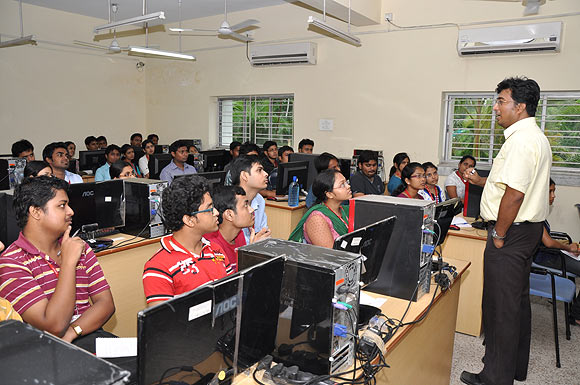
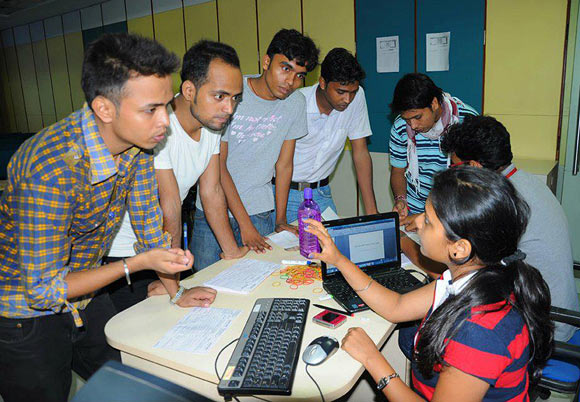

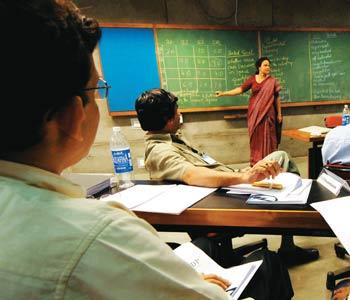
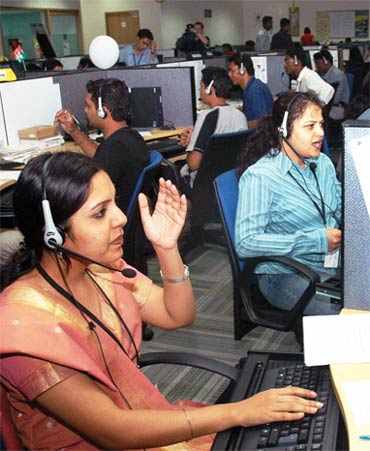
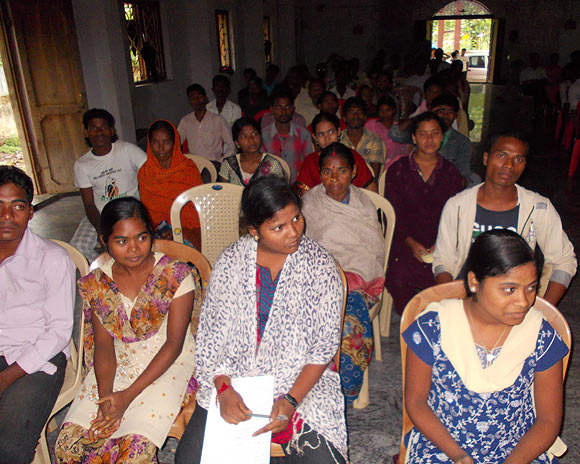
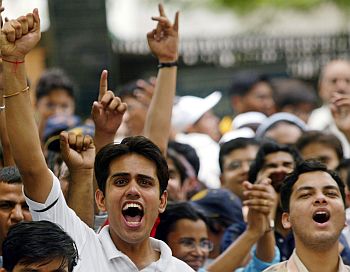
Comment
article